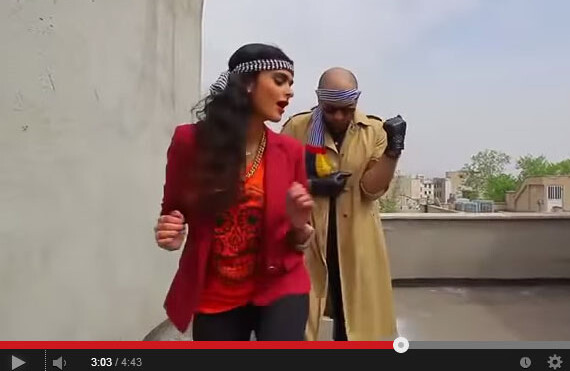Iran is an "as if" society. People live as if they were free, as if they were in the West, as if they had the right to an opinion, or a private life.
And they don't do too badly at it.
—Christopher Hitchens
Hassan Rouhani became Iranian president last summer on a wave of optimism. Following years of sanctions and economic stagnation, the reformist ran on a platform of improving the economy and diplomacy with the West. Upon assuming office, Rouhani spoke to U.S. President Barack Obama by phone, marking the first high-level communication between the two countries in more than 35 years.
The tech-savvy Rouhani is also quite vocal on Twitter about opening Internet access in Iran, yet even he is powerless against the ruling judicial class. Despite some of his recent messages, and possibly even in response to them, the Iranian government has harshly suppressed online activity in the past few weeks—banning Instagram and imposing strict prison sentences on eight Facebook users.
The government also arrested six young Iranians who had appeared in a YouTube video, dancing bareheaded on the rooftops of Tehran to the hit song "Happy" by Pharrell Williams. The video's director was imprisoned as well.
In an interview with IranWire prior to the arrests, one of the Iranian dancers said, "Despite all the pressures and limitations, young people are joyful and want to make the situation better. They know how to have fun, like the rest of the world." The video is one of countless similar versions that people around the world have posted to showcase their happiness. It quickly went viral.
According to IranWire, "the young women were forced to strip naked and perform squats in front of female police officers" during their detention. The arrestees were also forced to make confessions stating that they were tricked into making the film. Their official crime, according to Tehran's police chief, was "creating a vulgar clip which hurt public chastity."
Following international outcry and a hefty bail of about $10,000, the Iranian authorities released the dancers, though the director remains in prison. The video is one of the clearest examples of how Iranians live in the "as if" society that Christopher Hitchens described nearly a decade ago. They created the video as if they lived in an open society, but they were punished according to the reality of life in Iran. In the days since the arrests, many more people have created their own "Happy" videos in solidarity with the young Iranians.
The Iranian government's authoritarian response to the dancers is nothing new. The theocrats routinely imprison and torture people for crimes such as creating music or using social media. What is new this time around is that Rouhani, as president, appears to dissent with the clerics, in one of the most public divisions over culture among the Iranian leadership in years.
After the arrest of the "Happy" dancers, Rouhani posted this to Twitter:
"#Happiness is our people's right. We shouldn't be too hard on behaviors caused by joy." 29/6/2013
— Hassan Rouhani (@HassanRouhani) May 21, 2014
The tweet was recycled from when Rouhani won the Iranian election last year, but its timing and message were suggestive, especially in light of what he had said just a few days prior:
#Cyberspace should be seen as opportunity: facilitating two-way communication, increasing efficiency & creating jobs. pic.twitter.com/iYkzgHpXkQ
— Hassan Rouhani (@HassanRouhani) May 17, 2014
And more recently, in one of his most explosive posts to date, he said:
Let people pursue their own path to heaven; they can't be taken there by force. #CivilRights #Trust pic.twitter.com/GahR5yky83
— Hassan Rouhani (@HassanRouhani) May 24, 2014
This last tweet is nearly heretical in its intent, coming from the president of a country that imprisons people for drinking alcohol or going out in public with uncovered hair, where it is acceptable to call for the public flogging of an actress for kissing someone (on the cheek) at the Cannes film festival. Rouhani's tweeting is all the more contentious considering that Twitter is banned in Iran except for elected officials, though people often (illegally) overcome barriers through proxy servers.
The fact that the Iranian leadership has continued to limit Internet freedoms while Rouhani has campaigned for them demonstrates just how little power Rouhani actually has. In Iran, the president is partly a figurehead who does not hold much sway compared to the Ayatollah, who is appointed for life and heads the country. Elections in Iran are far from free. The people can only vote for candidates that the Ayatollah has already approved; Rouhani himself was one of these anointed. Candidates that provide true opposition and change are usually barred from running in the first place. Even moderate candidates can be blocked through electoral fraud, like Mir-Hossein Mousavi, whose 2009 loss to incumbent Mahmoud Ahmadinejad resulted in widespread protests that the government violently quashed.
The last reformist president to win an election in Iran before Rouhani, Mohammad Khatami, left the presidency in 2005 without securing many of the goals he had set. Unfortunately, it looks like Rouhani may be on a similar path. A recent United Nations report says human rights in Iran have not changed since Rouhani's inauguration.
So what does Rouhani's tweeting and public dissent actually accomplish? Any stirring of excitement about change in Iran needs to be tempered by the reality that change will never come from the current leadership. The people of Iran are a different story. Nearly ten years after Hitchens described Iran as an "as if" society, Iranians are continuing to slowly but surely push the limits of civil disobedience. Creating a little home-brew wine here, uploading some uncovered wisps of hair there, and living their lives—against all restrictions—toward the pursuit of happiness.




